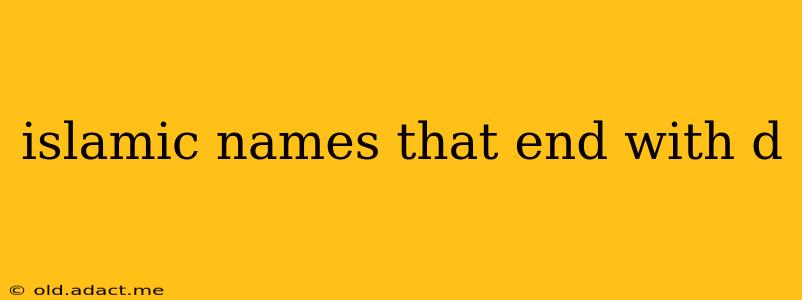Choosing a name for your child is a significant decision in many cultures, especially within the Islamic faith. Parents often seek names with beautiful meanings, reflecting their values and beliefs. This article explores a selection of Islamic names ending with the letter "D," providing insights into their origins and meanings. We'll also delve into some frequently asked questions surrounding naming practices in Islam.
What are some popular Islamic names ending in "d"?
Many beautiful and meaningful names within the Islamic tradition end with the letter "D." While popularity can fluctuate, some consistently favored names include:
-
Ahmed (أحمد): This is a highly popular name, meaning "praiseworthy" or "highly praised." It's associated with Prophet Muhammad's (peace be upon him) lineage and carries a deep significance within the Muslim community.
-
Hamid (حميد): Meaning "praiseworthy" or "one who is praised," Hamid is another excellent choice carrying positive connotations. It shares a similar meaning to Ahmed but offers a distinct sound.
-
Said (سعيد): This name means "happy," "fortunate," or "blessed." It conveys a sense of joy and optimism, representing desirable qualities for a child.
-
Majid (مجيد): Meaning "glorious" or "magnificent," Majid is a strong and elegant name reflecting grandeur and nobility.
-
Farid (فريد): Meaning "unique" or "one of a kind," Farid emphasizes individuality and exceptional qualities.
These are just a few examples; many other names with less common usage also end in "d," each with its own unique meaning and cultural significance.
Are there any specific guidelines for choosing Islamic names ending in "d" or any other letter?
Islamically, while there aren't strict rules dictating the ending letter of a name, parents generally prefer names with positive meanings and avoid those with negative connotations. The name shouldn't be associated with idolatry or anything that goes against Islamic principles. Consulting religious scholars or referring to comprehensive lists of Islamic names can be beneficial.
What are some less common Islamic names ending in "d"?
Beyond the more popular choices, several less common but equally beautiful names ending in "d" exist:
-
Shahid (شهيد): Meaning "martyr" or "witness," Shahid is a name with profound meaning, often associated with sacrifice and devotion to faith.
-
Dawood (داود): This is the Arabic form of the name David, a revered prophet in both Judaism and Islam.
How can I find more Islamic names ending in "d"?
Extensive online resources and books dedicated to Islamic baby names are readily available. These resources often categorize names based on various criteria, including the ending letter, meaning, and origin. You can explore these databases to discover a wider array of options beyond the examples listed here.
What factors should I consider when selecting an Islamic name ending in 'd' or any other letter?
Beyond the ending letter and meaning, consider:
- Pronunciation: Ensure the name is easily pronounceable in your language and culture.
- Flow: Consider how the name sounds with the family name.
- Meaning in other languages: Be mindful of any unintended meanings the name might have in other languages.
By carefully considering these factors and researching potential names, you can choose a meaningful and appropriate name that reflects your values and faith. Remember that choosing a name is a deeply personal decision; what resonates with one family might not resonate with another. The most important thing is to select a name you love and believe will be a source of blessing for your child.
